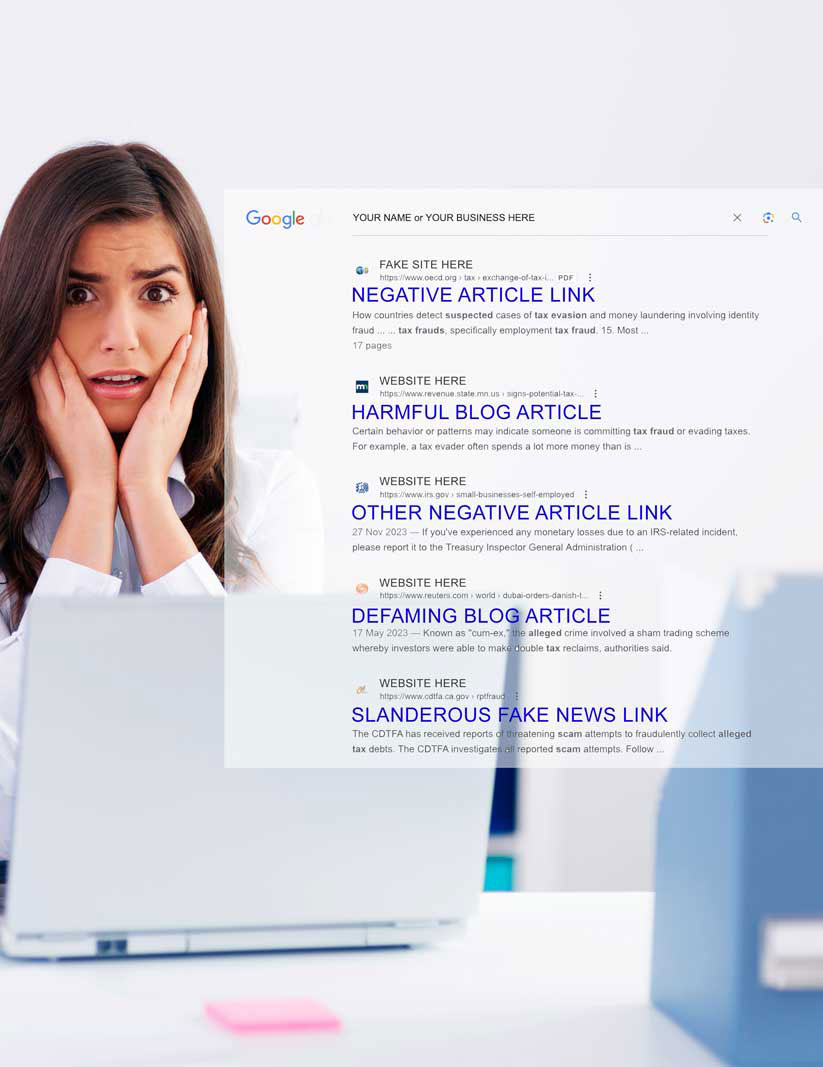
We also help you with these problems
Value-add Services in the Digital Space
Damaging articles
In the digital era, where information spreads at an unprecedented pace, damaging articles can have a profound impact on a company's reputation, client trust, and ultimately, its bottom line. On the right, you can see a number of reasons why negative press is particularly detrimental to businesses.
And finally, damaging articles pose a serious threat to a company's reputation, revenue, and long-term viability. This underscores the importance of proactive online reputation management to identify, address, and mitigate negative content, ensuring the company maintains a positive and trustworthy image in the digital landscape.
Erosion of Trust:
Trust is the cornerstone of any business relationship. Damaging articles can erode this trust overnight, making it challenging to rebuild. When potential or existing clients read negative content about a company, their perception is immediately influenced, leading to hesitancy in doing business with that company.
Immediate and Widespread Impact:
The internet's reach means that negative articles can spread rapidly across social media, forums, and other platforms, amplifying the adverse effects. This widespread distribution can attract unwanted attention, including from competitors and news outlets, further damaging the company's reputation.
Long-lasting Online Presence:
Once an article is published online, it can remain accessible indefinitely, continuously harming a company's reputation. Search engines often prioritize recent and relevant content, meaning a damaging article can appear prominently in search results related to the company, affecting its image long term.
Financial Consequences:
The immediate consequence of damaged reputation is often a loss of revenue. Clients may choose competitors, and potential deals may fall through. The long-term financial impact can include decreased stock prices for publicly traded companies, increased costs for crisis management, and marketing efforts to counteract the negative press.
Deterring Potential Investors:
Negative articles can deter potential investors or partners who conduct due diligence before making investment decisions. A tarnished reputation can signal instability or risk, leading investors to look elsewhere, stifling the company's growth and expansion opportunities.
Recruitment and Employee Morale:
A company's reputation not only affects its relationship with clients and investors but also its ability to attract and retain top talent. Negative press can demoralize existing employees and deter potential candidates, impacting the company's innovation and competitiveness.

Negative Search Results
Negative links carry significant weight in shaping public perception and can have a profound impact on a company’s reputation and bottom line. In today’s fast-paced digital world, information spreads rapidly, and negative content can go viral in moments, reaching a global audience with ease.
Prospective clients need not delve into the content of negative links; the mere presence of numerous adverse listings on a search engine results page can significantly dissuade them from pursuing any business engagement. This immediate visual impact underscores the critical importance of maintaining a positive online presence to foster potential business relationships.
Such articles can tarnish a brand’s image, eroding trust and confidence among current and potential customers. The immediate consequence often manifests as a loss of clients who choose to dissociate from brands associated with negative publicity.
This client exodus not only affects revenue streams directly but can also deter potential investors and partners, concerned about the brand's tarnished reputation and its future prospects.
The ripple effect of damaging articles can extend far into the future, impacting a company’s ability to attract talent, secure partnerships, and expand its customer base. It underscores the necessity for businesses to actively manage and safeguard their online reputation, emphasizing the importance of a strategic approach to mitigate the impact of harmful content and maintain the integrity of their brand.

Protect your name and your copyright
When scammers exploit a company's name and reputation to deceive customers, the consequences can be particularly devastating. This form of copyright infringement not only involves the unauthorized use of a company's trademarked name and assets but also manipulates its positive reputation to facilitate fraudulent schemes. The damage inflicted extends far beyond financial losses to the victims; it strikes at the heart of the company's brand identity and customer trust.
The immediate impact of such scams can be seen in the erosion of consumer confidence. Customers, having been deceived by schemes that falsely bear the company's name, may associate the company itself with fraud and deceit, regardless of its actual innocence. This association can be incredibly difficult to dispel, especially in the digital age where negative experiences and opinions can spread rapidly online and remain accessible indefinitely.
The long-term repercussions include a potential decrease in customer loyalty and a tarnished brand image, which can significantly hinder business growth and profitability. Moreover, the company may face legal challenges and regulatory scrutiny as it navigates the process of clearing its name and addressing the misuse of its intellectual property.
Repairing the damage often requires substantial investment in legal resources, public relations campaigns, and online reputation management services. However, even with these efforts, the lingering effects of association with a scam can affect customer perceptions and business opportunities for years to come.
Therefore, it's crucial for companies to proactively protect their intellectual property, monitor for misuse of their brand, and swiftly address any incidents of copyright infringement by scammers. Implementing robust security measures and educating customers about how to identify legitimate communications are essential steps in safeguarding a company's reputation and maintaining the trust of its clientele.
Consequences of Negative Online Reviews
An influx of bad client reviews can have a profound and immediate impact on a company's reputation, customer trust, and ultimately, its bottom line. In the digital age, where consumers frequently turn to online reviews to inform their purchasing decisions, negative feedback can deter potential customers before they even interact with your business.
In summary, too many bad client reviews pose a significant risk to any company. Effective management and a proactive response strategy are essential to protect your brand, maintain customer trust, and ensure the long-term success of your business in the competitive digital marketplace.
Eroding Consumer Trust
Trust is a cornerstone of customer loyalty and business success. Negative reviews, especially in large numbers, can quickly erode trust in your brand. Prospective customers, seeing a pattern of dissatisfaction, may question the quality of your products or services and opt for competitors with more positive reputations.
Impact on Sales and Revenue
The immediate consequence of lost trust is often a decline in sales. As negative reviews multiply, they can dominate your online presence, turning away potential business and directly impacting your revenue streams. This is particularly true for industries where competition is fierce, and alternatives are readily available.
SEO and Online Visibility
Search engines take user reviews into account when ranking websites. A preponderance of negative reviews can affect your site's search engine optimization (SEO), making it harder for potential customers to find you online. Lower visibility in search results can further decrease new customer acquisition.
Challenges in Attracting Talent
The impact of negative reviews isn't limited to customers alone; they can also affect your ability to attract and retain top talent. Prospective employees often research a company's reputation before applying or accepting a job offer. A poor online reputation can make it difficult to hire and keep the skilled individuals essential for your business's growth and innovation.
Long-term Brand Damage
While immediate sales impacts are concerning, perhaps more daunting is the long-term damage to your brand image. Rebuilding a tarnished reputation can be a lengthy, challenging process requiring significant resources. The digital footprint left by negative reviews can linger for years, affecting perceptions of your brand far into the future.
Optimizing Search Engine Results
Search Engine Optimization (SEO)
SEO is the cornerstone of enhancing online visibility. By identifying and targeting specific keywords relevant to the client's business, optimizing website content, improving technical aspects such as site speed and mobile responsiveness, and focusing on local SEO practices like Google My Business optimization, we can significantly boost the client's search engine rankings.
Link Building
Link Building efforts aim to acquire high-quality backlinks from reputable websites, which not only improves search engine rankings but also drives referral traffic. This strategy complements SEO efforts and enhances the client's authority and credibility online.
Analytics and Adaptation
Finally, Analytics and Adaptation ensure that strategies are effective and yield the desired results. By using analytics tools to track the performance of all digital marketing efforts, we can gain valuable insights into what works best. Regularly reviewing and adjusting strategies based on this data allows us to stay ahead of changes in search engine algorithms and market trends, ensuring continuous improvement and growth.
By implementing this multifaceted approach, we not only improve the client's search engine results but also enhance their overall online presence, reputation, and ability to attract more customers. This comprehensive strategy is designed to drive results, foster business growth, and ensure the client remains competitive in the digital landscape.

Trademark infringements
A company must act decisively and swiftly against trademark infringements online to prevent scammers from exploiting their brand and deceiving unsuspecting individuals. Such proactive measures are crucial for several reasons:
Preserving Brand Integrity
Trademark transgressions can severely damage a brand's integrity. When scammers use a company's trademark without authorization, they often engage in fraudulent activities that can tarnish the brand's reputation. Consumers deceived by these scams may associate their negative experiences with the actual brand, leading to a loss of trust and confidence in the company.
Protecting Consumer Trust
Consumer trust is a cornerstone of brand loyalty and business success. By swiftly addressing trademark infringements, a company demonstrates its commitment to protecting its customers from fraudulent schemes. This not only helps in maintaining current customer relationships but also reassures potential customers of the brand's reliability and security.
Safeguarding Company Assets
A trademark is a valuable asset that differentiates a company's products or services in the marketplace. Unauthorized use of a trademark by scammers can dilute its distinctiveness and value, potentially leading to financial losses and a weakened competitive position. Swift action against trademark transgressions helps to safeguard these intellectual property assets and ensure they continue to provide a competitive advantage.
Legal Compliance and Recourse
Taking immediate action against trademark infringements allows companies to enforce their legal rights and seek recourse. This may involve removing infringing content from the internet or taking legal action against the perpetrators. By doing so, companies not only protect their own interests but also contribute to broader efforts to combat online fraud and trademark abuse.
Maintaining Market Position
A company's market position can be adversely affected by the unchecked misuse of its trademark. Scammers exploiting a trademark can create confusion among consumers and erode the brand's market presence. Promptly addressing such infringements helps maintain the clarity and strength of the brand's market position, ensuring that consumers can easily identify and trust the genuine brand.
In conclusion, the necessity for companies to swiftly counter trademark infringements online is paramount. Doing so is integral to preserving brand integrity, protecting consumer trust, safeguarding company assets, ensuring legal compliance, and maintaining a strong market position. These actions are essential to prevent scammers from leveraging a company's trademark for fraudulent purposes, thereby protecting both the brand and its consumers from potential harm.


